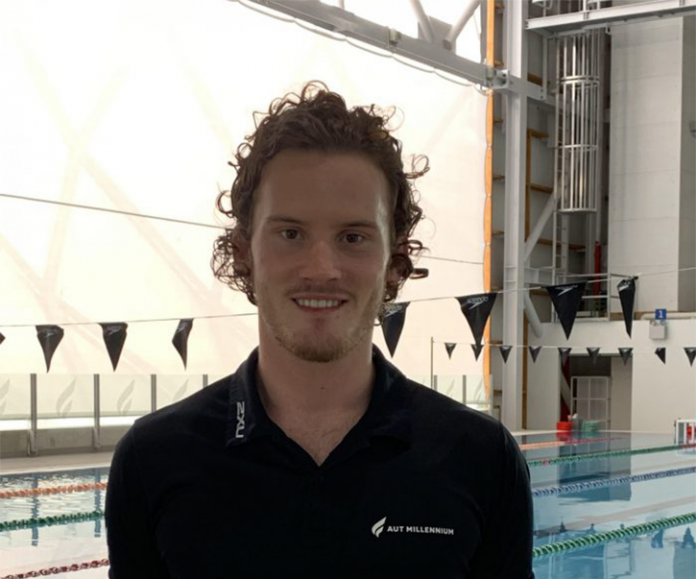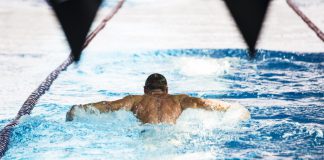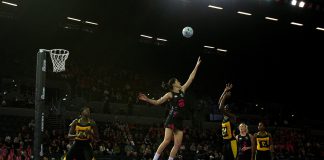There is a vast amount of swimming and coaching expertise within AUT Millennium’s Swim School. This year, we’ve been thrilled to welcome Scott Fairbairn back to our team, bringing his knowledge and passion for teaching our young swimmers.
Scott has a strong competitive swimming background, having competed for North Shore Swimming and represented Northern Region in surf lifesaving. But it’s coaching and teaching swimming that is his real passion, something he’s very keen on sharing with the families of AUT Millennium. “In New Zealand, we’re surrounded by water, so everyone needs to learn how to swim in order to enjoy our Kiwi lifestyle,” he says. “There’s the competitive arm of swimming, but there are basic skills we should all be competent in. No one wants to get to 16 or 17, when your friends are all heading to the beach or for a surf, and you can’t join them because you don’t know how to swim.”
Having started swimming competitively aged eight, Scott was in the top North Shore Swimming squad by 14, working under Tomas Ansorg and training 20 hours a week. His preferred disciplines were breaststroke and the individual medley, and his success saw him secure a swimming scholarship at St Peter’s College in Cambridge. It was during this time he realised he didn’t want to continue as a competitive swimmer, and that his passion for the sport lay elsewhere. “I found coaching to be better than swimming myself,” he recalls. “Sharing my knowledge with people, helping them develop and improve, seeing that accomplishment when they get there themselves… I can’t really put it into words. It’s so rewarding.”
Leaving for Cambridge required Scott to give up his first role as a swim teacher at AUT Millennium, but after a few years as a coach and team leader at North Shore Swimming, he’s now back as a supervisor, a role for more experienced teachers to share their knowledge with parents and staff. Based on pool deck, Scott is responsible for overseeing all lessons and giving tips to teachers, as well as liaising with parents. “I enjoy working with the teachers,” he shares. “We’re trying to develop their skillset, passing along our knowledge and experience. For example, reminding them that some kids are visual learners, some are aural learners, and that there’s just not one way to teach.” Scott and other supervisors shadow newer teachers to give them support and encouragement, and check the quality of the lessons is in line with both parents’ and AUT Millennium’s expectations.
Swim School Operations Manager Rachael Jones is thrilled to have Scott back on board. “He just has such a natural ability to connect with people,” she says. “His competitive background has given him confidence in all his abilities, especially in dealing with people, both staff and parents.” This branch of his role is especially interesting for Scott, who is currently studying management and marketing at University. “I really like getting the best out of people, finding out what motivates them,” he tells. “That’s what management is about, and I like to make sure that our swim teachers know we have their back as a supervisor, and we’re there to help them be the best they can be, as well as the swimmers.” This desire to help people flourish extends to his future plans too. At this stage, Scott intends to move into high school teaching once he’s finished his studies.
The benefits of surf swimming
Having competed at club and regional level internationally in the sport of surf lifesaving, Scott knows that open water swimming is different from the more predictable pool environment. In Year 7, Scott joined his best friend at surf training, and by age 14 was a qualified lifeguard. “Just like pool swimming, I look at surf training as a life skill for us in New Zealand,” he says. “A lot of children don’t know the signs of drowning, or how to spot a rip. Surf teaches those skills, as well as things like CPR, which is relevant away from the water too.” He enjoyed the tactical nature of ocean racing, with drafting, reading waves and more explosive nature of the swimming. “It’s different every time in the open water, I really loved that. It challenged me as a swimmer and increased my fitness.” Scott travelled around the country competing in surf events, and his career highlight was representing Northern Region in Australia as part of the 2014 Trans Tasman team.
While he’d recommend surf lifesaving to anyone, he’s particularly pointed in this advice for men. “We’re overrepresented in drowning statistics,” he reflects. “We have this bravado and overconfidence, but not enough guys know how to be comfortable in the ocean, particularly when it’s not calm. Surf is great for that reason.”
Advice to parents
Having been a swimmer himself, and now with his vantage point at poolside, Scott has a simple message for parents of young swimmers. “Trust the process,” he says emphatically. “Learning to swim confidently is not a short process, especially if your child is only swimming once a week for 30 minutes.” He warns against comparing your child to any others in their class, or even with their siblings. “Every child is different, and between the ages of 5-12, natural talent plays a big part in how fast a child moves through swimming levels,” he tells. “The biggest thing you can do to help your child progress is take them to the pool just to play. Through play and having fun, they’ll get more and more familiar with the feel of the water. That confidence will translate into their lessons.”
He’s also quick to add that while there are a lot of benefits to competitive swimming, it’s something that parents need to be careful with. “Please check if your child actually wants to compete,” he implores. “I’ve seen so many kids thrown into competitive swimming because their parents want them to do it. Because there are early hours and so much training, the motivation really needs to come from the child themselves. Some kids have that competitive side and love racing, which is great, but some don’t.” He also wants to bust a common myth about competitive swimming. “There’s plenty of time to get into racing,” he says. “Everyone wants their kid to be winning medals at seven, but I’d recommend waiting until 10 or so before getting into it. Racing is different than swimming lessons, it’s more about winning. Let your child get confident in the water and have fun before adding that into the mix.”
Please feel free to chat to our poolside supervisors and benefit from their skills and expertise. Parents are encouraged to ask about their child’s swimming strengths and work-ons, and advice for swimming activities away from lessons. Our supervisors are a friendly bunch who are happy to talk about how to make your child the best swimmer they can be.







































